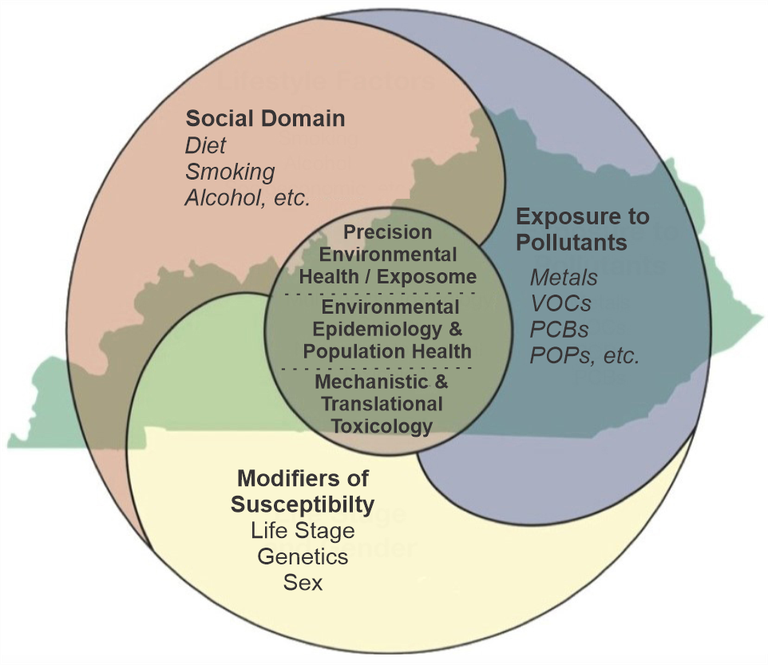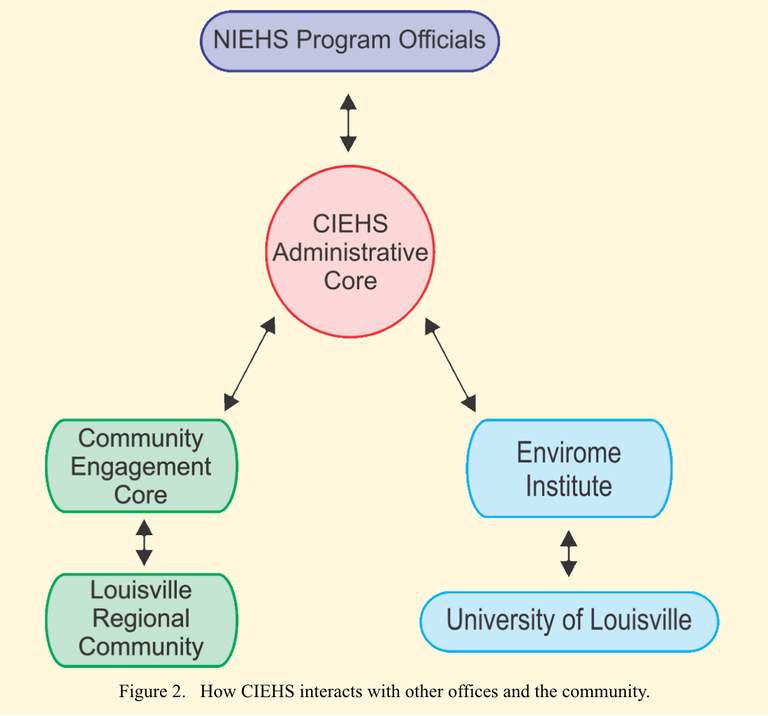Administrative Core
Specific Aims
The University of Louisville’s (UofL) Center for Integrative Environmental Health Science (CIEHS) is building a framework to integrate the interactions of pollutants and structural determinants of health to better understand these interactions in human health and disease across life stages and how these interactions are modified by sex (Fig. 1) and to improve the health of the Louisville Regional Community. We will achieve this goal by fostering unique translational research on pollution and lifestyle as cofactors that influence disease, and transformative interdisciplinary research on prevention and/or mitigation of disease resulting from exposure to these cofactors at various life stages, and considering sex as a modifier.

The CIEHS Administrative Core integrates Louisville Regional Community environmental health concerns mediated by Community Engagement Core with Environmental Health Institute and the University of Louisville, and interfaces with NIEHS Program Officials. (Fig. 2.).

The specific aims of the administrative core are:
- Provide leadership in coordinating and integrating Center components and activities. Regular meetings of the Center Director with Core Leaders to review activities will provide opportunities to coordinate activities and to identify candidate projects for translation and opportunities for ‘reverse translation’.
- Cultivate and recruit junior and mid-level investigators to enhance careers and research programs in environmental health sciences. The Career Development Component will actively recruit junior environmental health science investigators and provide mentorship. Mid-level investigators will be recruited to environmental health science research by offering collaborative pilot project grants.
- Assess productivity, effectiveness, and appropriateness of CIEHS activities and cores.
- Determine CIEHS membership, assess scientific opportunities and areas for collaboration among CIEHS members.
- Organize CIEHS activities, such as retreats, invitation of consultants, meetings, and focus groups. Monthly seminars and annual retreats provide forums for discussing current concepts in environmental health sciences. Meetings with community groups organized in partnership with the CEC provides multi-directional communication with community stakeholders. Annual symposia at Research!Louisville will showcase CIEHS activities to the UofL community.
- Provide recordkeeping of meeting minutes and measures of success including use of CIEHS facilities, publications, pilot project awards, and new grant applications resulting from preliminary data enabled by the CIEHS.
- Organize Internal and External Advisory Committees. Monthly meetings of the Internal Advisory Committee (IAC) will provide a forum for communication within the CIEHS. Annual meetings of the External Advisory Committee (EAC) will provide assessment of progress toward goals and guidance on strengths and weaknesses.
- Interact with other Environmental Health Science Core Centers (EHSCC), the NIEHS, and other appropriate individuals, groups, organizations. The CIEHS Leadership will interact with other Center Directors and NIEHS program officials at the EHSCC meeting, at Society of Toxicology meetings and by direct contact via email and telephone. Other appropriate individuals including prominent environmental health science investigators will be invited to present seminars and meet with CIEHS faculty. The CIEHS Leadership will interact local community groups and organizations through efforts led by the CIEHS Community Engagement Core.
